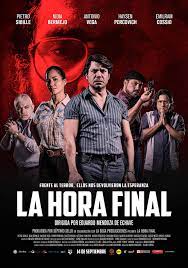
LA HORAL FINAL/ THE LAST HOUR
Peru, 2017, 117 minutes, Colour.
Pietro Sibille. Nidia Bermejo, Tommy Parraga.
Directed by Eduardo Mendoza de Echave.
To appreciate this story of Peruvian politics in the early 1990s, it is recommended to do a bit of historical research before watching. Research will indicate something of the social situations of the 1970s, the emergence of the revolutionary Maoist Shining Path movement and some of its violent consequences. It would also indicate the political moves against Shining Path, especially in tracking down its leader and bring him to justice in the early 1990s.
This is a fictionalised version of the search for the leader, the detective work of the special force investigating rebels. They work in parallel, not always in agreement with, the governmental Secret Service.
The story is personalised with a focus on one of the detectives, committed to his work, especially in cover work in the Andes for several years where he met his wife, but they are now estranged, his wanting some more contact with his son. The other detective is of native Indian background, a nurse becoming a policewoman, concerned about the disappearance of her teacher mother, the collapse of her father, and her younger brother ideal logically committed to Shining Path.
The film offers the scope of those sympathetic to the movement, including various academics. There is a great deal of surveillance going on, agents with cameras in large bags, some IT coordination in the style of the 1990s.
And, eventually, mission accomplished. Some of the commentators, depending on their political stances, question the stances of the filmmaker.
- Peru in the latter 20th century, social upheaval, The Shining Path?
- Audience knowledge of Peruvian history, the 1980s, upheaval, Guzman and The Shining Path, Maoist revolution, Guzman in hiding, the various attempts to find him?
- Atmosphere of the period, Lima, the city, the streets and homes, surveillance? Official offices? Torture rooms? Going out of the city, the bus rides, cars, the ports, factories? The musical score?
- The focus on Zambrano, the opening, alone, health, the background of his marriage, the shared experiences with his wife in the mountains, their son, her wanting to leave Peru, a lawyer and the relationship, his relationship with his son, the meetings, homework, sport, the son curious about his work? His carelessness, driving, the crash, the confrontation with the owner, money difficulties, payment of rent?
- The organisation, the head, the team, the range of people, men and women, in the office, technicians, surveillance, cameras in bags? The targets, following them, techniques to avoid discovery?
- Gabriella, the nurse, treating victims, deciding to join the police? Her indigenous background? The story of her family, teacher mother and disappearance, the father and his despair, the younger brother, her finding him, his allegiance to Shining Path, her following him, the discussions, his ideology, avoiding his sister, her finding him, with the bomb in the car, the explosion, the dead? Her arresting her brother?
- The various links to Shining Path, the Academy and paying the rent to the German lady, the students, the protests and demonstrations, blocking Zambrano’s driving through? Arana, under suspicion, surveillance, the bags, the money?
- Zambrano and Gabriella, the attraction, the relationship? Her not revealing the truth about her brother, Zambrano and distrust? Their being pursued by the Intelligence Office, they’re being tortured? Zambrano, the document, the pen and the attack, Gabriella hanged, her interrogator and his sexual activity? The rescue? Under suspicion from the boss, being followed?
- The raid on the house, all the Maoist paraphernalia? The videocassettes, Zambrano watching, the focus on Guzman?
- Trailing drivers, finding the house, the decision to raid, the taking of Guzman?
- The perspectives of the film director, sympathies and interests, Peru, social issues, the economy, rich and poor, revolutions, intelligence agencies?